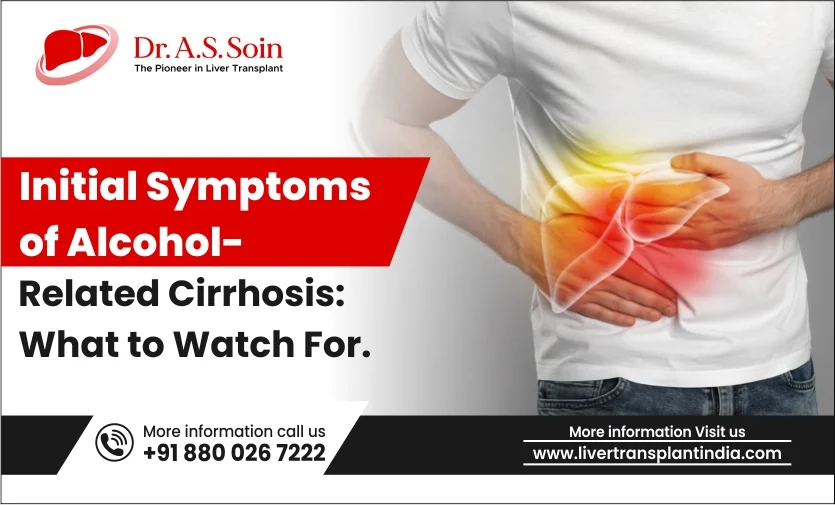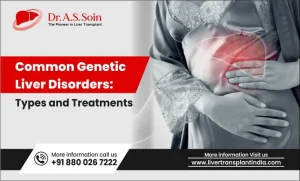Alcohol-related cirrhosis is a serious liver condition often caused by prolonged alcohol consumption. The disease impacts liver function, leading to various symptoms that may start mildly and worsen over time. Early detection can improve outcomes significantly. When it comes to treating cirrhosis, Dr. A.S. Soin offers expert care to help patients manage symptoms and prevent further liver damage. Our team focuses on customised treatment options to support every step of your recovery journey.
This article highlights the initial symptoms of alcohol-related cirrhosis, what to look for, and available new treatment for cirrhosis.
Table of Contents
ToggleWhat is Alcohol-Related Cirrhosis?
Alcohol-related cirrhosis is a late stage of liver disease that occurs after years of heavy drinking. Alcohol damages liver cells over time, leading to inflammation and scarring, known as fibrosis. If unchecked, this fibrosis progresses into cirrhosis, which severely limits the liver’s ability to function. In cirrhosis, healthy liver tissue is gradually replaced with scar tissue, impairing blood flow and the liver’s ability to perform critical tasks like detoxifying the body, producing bile, and processing nutrients. Eventually, alcohol-related cirrhosis can lead to liver failure.
People diagnosed with alcohol-related cirrhosis face significant health risks, including fluid accumulation, jaundice, and an increased risk of infections. Early intervention, including lifestyle changes and cirrhosis treatment, can make a difference. Liver cirrhosis treatment options vary depending on the condition’s severity. While no single new treatment for cirrhosis can reverse the scarring, specific therapies can halt or slow its progression. In advanced cases, liver transplant for cirrhosis may become necessary.
Signs and Symptoms that Indicate You Have Alcohol-Related Cirrhosis
Recognising early signs of alcohol-related cirrhosis helps in seeking timely treatment, potentially slowing progression and improving overall liver health. Here are all the signs and symptoms you need to watch out for:
Fatigue and Weakness
Fatigue is often one of the first signs of alcohol-related cirrhosis. It can range from mild to severe, affecting daily activities. Feeling persistently weak or tired could signal liver issues and require medical attention.
Jaundice
Yellowing of the skin or eyes, known as jaundice, indicates a buildup of bilirubin in the body due to liver dysfunction. If you notice this symptom, consult us immediately for evaluation and liver cirrhosis treatment options.
Abdominal Pain and Swelling
Liver cirrhosis can lead to discomfort in the upper right abdomen, alongside swelling due to fluid retention. This pain may worsen after meals or physical activity as the liver struggles to process blood and nutrients. Swelling, known as ascites, often requires draining procedures if it becomes severe and uncomfortable. This symptom often signals that liver damage is worsening, and immediate attention is necessary. Dr A.S. Soin has treated multiple patients with such symptoms and brought them to a quick path to recovery.
Loss of Appetite and Weight Loss
Appetite loss, along with unexplained weight loss, is common in cirrhosis. The liver’s reduced capacity to break down fats and proteins can cause early satiety, leading to nutrient deficiencies. Over time, this can result in significant muscle wasting and malnutrition, further weakening the body. A weakened liver affects digestion and the body’s ability to absorb nutrients, making you feel full quickly and lose weight unintentionally.
Easy Bruising and Bleeding
Cirrhosis impairs the liver’s ability to produce clotting factors, leading to easy bruising and bleeding. Even minor injuries may cause large bruises or prolonged bleeding, as the liver can’t efficiently regulate clotting. In advanced stages, frequent nosebleeds or gum bleeding may occur without apparent cause. You might notice prolonged bleeding even from minor cuts, which could indicate advanced liver damage.
Itchy Skin
Severe itching can be caused by bile salts building up under the skin due to poor liver function. This itchiness, often most intense at night, may not improve with typical lotions or antihistamines. Persistent scratching can lead to skin irritation and sores, increasing the risk of infection. This can lead to discomfort and may require medical management to alleviate the symptoms.
Swelling in the Legs and Ankles (Edema)
Fluid retention, especially in the legs and ankles, is another early symptom. This swelling, often noticed after prolonged standing or at the end of the day, may cause skin tightness and discomfort. In severe cases, the swelling can limit mobility and require intervention to drain excess fluid. It’s usually due to liver-related hormonal imbalances affecting fluid levels, and it should prompt a visit to discuss liver cirrhosis treatment.
Spider-Like Blood Vessels on the Skin
These are small, red blood vessels that spread out like a spider web on the skin’s surface. Known as spider angiomas, these markings are usually found on the chest, face, and arms in cirrhosis patients. They are caused by elevated estrogen levels, as the liver is less effective at hormone regulation. They’re often seen in cirrhosis cases and may be an early indicator of liver stress.
Confusion and Cognitive Impairment
Liver damage can lead to a buildup of toxins in the bloodstream, causing confusion, forgetfulness, and difficulty concentrating. Symptoms of hepatic encephalopathy may include unusual mood changes, personality shifts, and lack of coordination. These cognitive issues can affect daily activities and often require ongoing management to prevent worsening. Known as hepatic encephalopathy, this symptom often requires immediate intervention.
Dark Urine and Pale Stool
Darkened urine and pale stools are signs of bile obstruction caused by liver dysfunction. This colour change in urine may look tea- or cola-coloured, while stools may appear unusually light. These changes indicate the liver is not effectively processing bile, which is essential for digesting fats. Such changes are often seen in patients with progressing liver disease.
Muscle Cramps and Weakness
With cirrhosis, the liver struggles to produce necessary proteins, leading to muscle loss and weakness. Muscle cramps, especially in the legs, may become frequent and uncomfortable, often occurring at night. This muscle wasting, known as sarcopenia, is common in cirrhosis and indicates worsening liver function.
Fever and Frequent Infections
The liver’s weakened function reduces the immune system’s ability to fight infections. Patients with cirrhosis often experience low-grade fevers and frequent infections, such as respiratory or urinary tract infections. This increase in susceptibility to illness reflects the liver’s diminishing capacity to filter harmful pathogens from the bloodstream.
Vomiting Blood or Blood in Stool
Swollen blood vessels in the digestive tract, known as varices, can rupture due to increased liver pressure, leading to internal bleeding. Symptoms include vomiting blood or finding blood in stool. This serious symptom requires urgent medical intervention, as it poses a life-threatening risk if not treated immediately. If you see such symptoms, consult Dr A.S. Soin at the earliest to get his expert opinion and start your journey to healing.
Nausea and Vomiting
Cirrhosis can lead to frequent nausea and vomiting, a result of impaired bile production and toxin buildup. The liver’s inability to process waste disrupts digestion, causing discomfort. Persistent nausea and vomiting may also contribute to weight loss and poor appetite, complicating nutrition and overall health.
Sensitivity to Medications
Liver damage affects the body’s ability to metabolise medications, making patients unusually sensitive to their effects. Normal drug doses may lead to severe side effects or toxicity, as the liver cannot break down substances efficiently. Doctors often need to adjust dosages to avoid adverse effects in cirrhosis patients.
Dry Mouth and Excessive Thirst
Cirrhosis affects fluid and electrolyte balance, often causing dehydration. Patients may experience persistent dry mouth and an increased need to drink fluids. This symptom reflects the liver’s compromised ability to regulate hydration and can further impact overall well-being if fluid levels are not managed.
Bad Breath (Fetor Hepaticus)
In cirrhosis, toxins accumulate in the bloodstream due to poor liver function, resulting in a distinctive “musty” odour in the breath called fetor hepaticus. This odour is often caused by sulfur compounds and indicates significant liver damage, pointing to the liver’s reduced capacity for detoxification.
Hormonal Imbalance
The liver regulates hormone levels, including sex hormones like estrogen and testosterone. With cirrhosis, hormone imbalances may occur, leading to symptoms such as breast enlargement in men, irregular periods in women, and sexual dysfunction. These hormonal shifts further signal the liver’s declining ability to maintain bodily balance.
Decreased Mental Sharpness
Cirrhosis can lead to confusion, memory problems, and difficulty concentrating, a condition known as hepatic encephalopathy. This occurs as toxins accumulate in the brain due to the liver’s failure to filter them out. It can range from mild forgetfulness to severe cognitive impairment, impacting daily life and independence.
Hypoglycemia (Low Blood Sugar)
The liver plays a critical role in glucose regulation. Cirrhosis affects its ability to release stored sugar, leading to hypoglycemia. Patients with low blood sugar may experience dizziness, sweating, and weakness. Frequent episodes of hypoglycemia can indicate serious liver dysfunction and require prompt medical attention. However, with Dr A.S. Soin’s consultation and advice, you will be able to manage your signs and symptoms,
Medical Procedures to Mitigate the Symptoms of Alcohol-Related Cirrhosis
This section will cover medical procedures and treatments that help manage alcohol-related cirrhosis symptoms and improve patient quality of life.
Medications to Slow Disease Progression
The best drugs for liver cirrhosis and best treatment for liver cirrhosis focus on reducing inflammation and preventing further scarring. Depending on individual needs, our team may prescribe medications to manage symptoms and support liver health.
Endoscopic Procedures
Endoscopic procedures can help manage complications like variceal bleeding. These minimally invasive procedures can be lifesaving, preventing bleeding and helping patients manage cirrhosis symptoms effectively.
Liver Transplantation
For advanced cases, liver transplant for cirrhosis may be the best option. Dr. A.S. Soin and our expert team offer guidance and support through this life-changing procedure, helping patients move toward healthier lives.
Paracentesis
In cases of severe fluid retention, paracentesis—removing excess fluid from the abdomen—may relieve discomfort. This procedure is common in cirrhosis patients experiencing ascites and can improve comfort.
Lifestyle Changes
Lifestyle adjustments, like stopping alcohol use and eating a liver-friendly diet, along with the best drugs for liver cirrhosis, are crucial for slowing cirrhosis progression. With our guidance, these changes can improve symptoms and support long-term liver health.
Conclusion
Recognising alcohol-related cirrhosis early is crucial for effective treatment. Addressing symptoms quickly can protect your health and improve your quality of life. So, if you experience any of the above signs, consult Dr. A.S. Soin today! He is here to guide you toward the best treatment for liver cirrhosis, ensuring you receive the expert care you need.








